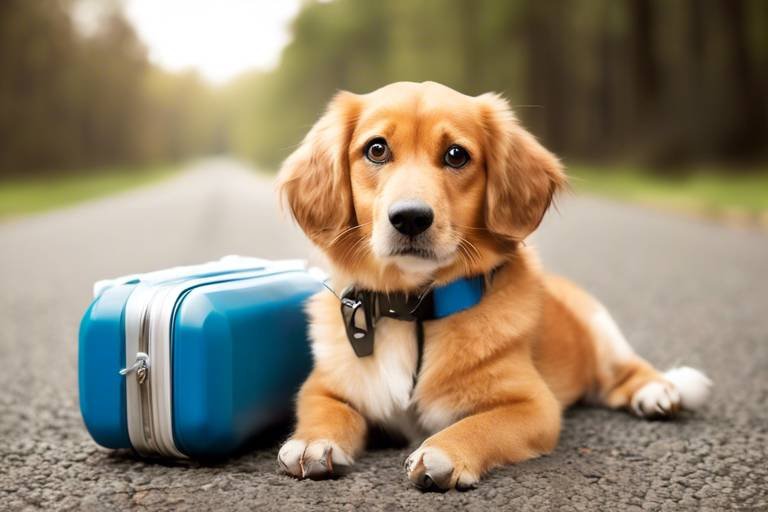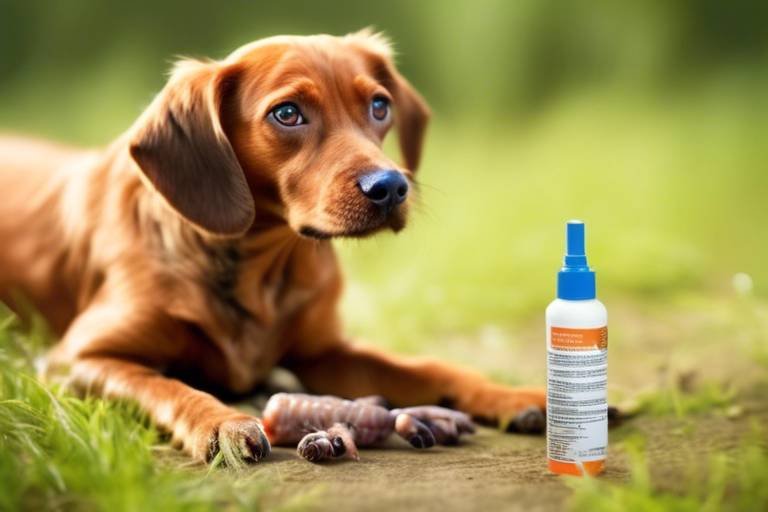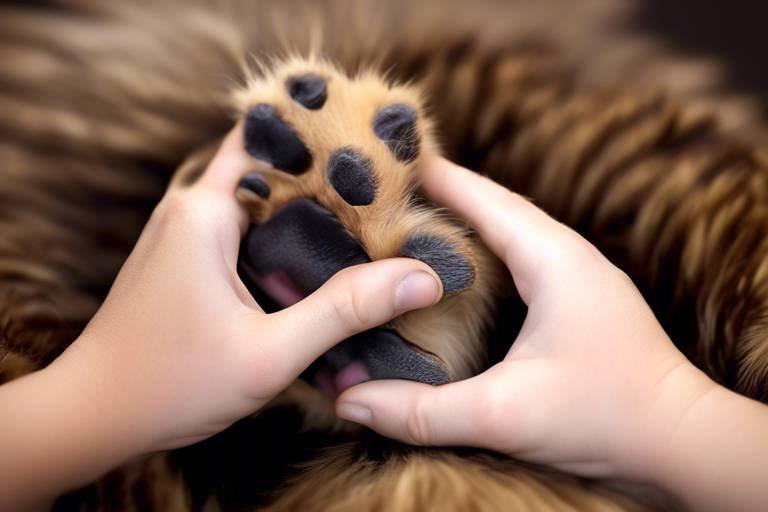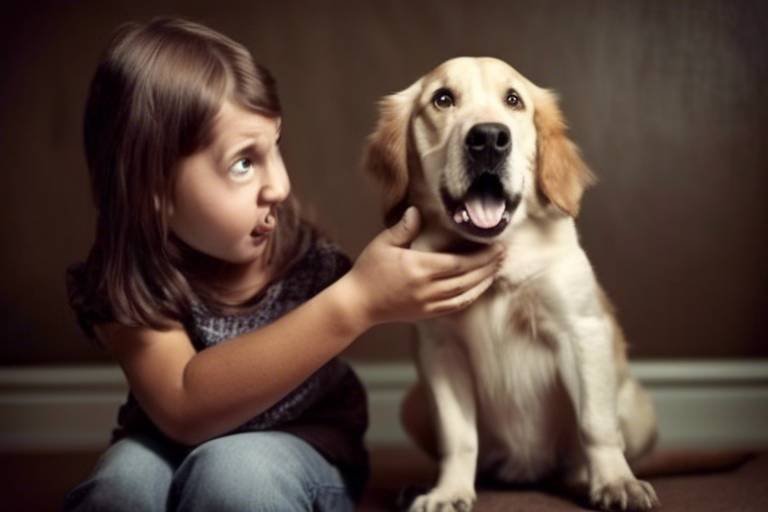What to Include in Your Pet's Travel Safety Kit
Traveling with your furry friend can be one of the most rewarding experiences, but it also comes with its own set of challenges. Ensuring your pet's safety and comfort during the journey is paramount. That's why creating a Travel Safety Kit is essential. This kit should be packed with all the necessities to keep your pet happy, healthy, and secure while on the road.
First and foremost, you need to consider your pet's health. Just like you wouldn’t leave home without your important documents, your pet shouldn’t travel without theirs either. This includes health records and vaccination documents. These papers are not just for show; they can be crucial if your pet needs to visit a vet or if you're staying at a pet-friendly hotel that requires proof of vaccinations. You wouldn’t want to be caught off guard, right?
Next, let’s talk about emergencies. Imagine being on a scenic road trip and, suddenly, your pet gets a minor scrape. A well-stocked first aid kit can be a lifesaver in such situations. Essential items to include are:
- Bandages
- Antiseptic wipes
- Tweezers
- Gauze pads
These items can help you address minor injuries or health issues while on the road, giving you peace of mind as you travel.
Don’t forget to pack any medications your pet may need, along with a detailed list of dosages. Having these on hand is crucial for preventing health issues and ensuring your pet remains comfortable throughout the journey. Just like you wouldn’t forget your own medication, your pet deserves the same level of care.
Traveling to new areas can expose your pet to unfamiliar pests. Therefore, including preventative treatments for fleas and ticks in your kit is vital. This not only protects your pet from infestations but also from potential diseases carried by these pests. Think of it as giving your pet a shield against unwanted attackers!
Let’s face it—travel can be stressful for pets. Consider adding calming aids like pheromone sprays or natural supplements to your kit. These can help ease anxiety and promote a more relaxed travel experience. Just like a comforting blanket can soothe a child, these aids can help your pet feel more at ease.
In the event of an emergency, having access to help is crucial. Always carry a list of emergency contacts, including your veterinarian and local animal hospitals. This ensures you have access to medical assistance if your pet requires it while away from home. It’s like having a safety net—always good to have, just in case!
Keeping your pet well-fed and hydrated is just as important as their safety. Pack enough food and portable water containers to ensure your pet stays nourished throughout the journey. Digestive issues can arise if pets are not fed properly, and no one wants a grumpy pet on a long drive!
Investing in collapsible or travel bowls can make feeding and watering on the go a breeze. These bowls are convenient, lightweight, and can be stored easily when not in use. Imagine pulling over at a scenic vista and being able to whip out a bowl for your thirsty pup in seconds!
Include some of your pet's favorite treats in your kit to keep them happy and motivated during travel. Treats can serve as rewards for good behavior or distractions during stressful moments. Just like we enjoy snacks on a road trip, your pet deserves a little something special too!
Packing familiar items, such as a favorite blanket or toy, can provide a sense of comfort to your pet while traveling. These items help reduce anxiety and create a sense of security in unfamiliar environments. Think of it as bringing a piece of home along with you—comfort is key!
- What should I include in my pet's travel safety kit?
Essential items include health documents, a first aid kit, medications, food and water supplies, and comfort items. - How can I help my pet feel more comfortable during travel?
Bring familiar items like a favorite blanket or toy, and consider calming aids to ease anxiety. - What if my pet gets sick while traveling?
Always have a list of emergency contacts, including your veterinarian and local animal hospitals, to seek help if needed.

Essential Health Documents
When it comes to traveling with your beloved pet, one of the most critical aspects to consider is their health documentation. Just like we carry our ID and medical records, your furry friend needs their own set of essential health documents to ensure a smooth journey. These documents not only provide proof of your pet’s health status but also help you comply with various travel regulations that might be in place.
Imagine arriving at a pet-friendly hotel only to find out that you need to present vaccination records for your dog or cat. It can be a frustrating situation, right? That's why having these documents readily available is crucial. Here’s a breakdown of the essential health documents you should include in your pet's travel safety kit:
- Vaccination Records: This includes proof of vaccinations against rabies, distemper, and any other pertinent diseases. Some states or countries require specific vaccinations, so it's vital to check ahead of time.
- Health Certificate: A health certificate from your veterinarian is often required, especially if you’re traveling across state lines or internationally. This document certifies that your pet is free from contagious diseases and is fit for travel.
- Medication Records: If your pet is on any medications, a list detailing the dosages and administration schedule is essential. This ensures that you can maintain their health regimen while on the road.
Additionally, you might want to keep a copy of your pet's microchip information handy. In the unfortunate event that your pet goes missing, having this information can significantly increase the chances of a safe return. It’s also a good idea to have your veterinarian's contact information easily accessible, in case you need to reach out for advice or assistance during your travels.
To make it easier, consider creating a travel folder specifically for your pet's health documents. This folder can include all the necessary paperwork, neatly organized, so you can quickly access it whenever needed. You might even want to keep a digital copy on your phone or in the cloud, just in case the physical documents get lost or damaged.
In summary, being prepared with your pet’s essential health documents not only ensures compliance with travel regulations but also provides peace of mind. After all, the last thing you want is to face unexpected hurdles when you’re trying to enjoy a getaway with your furry companion!

First Aid Supplies
When embarking on an adventure with your furry companion, it's crucial to be prepared for the unexpected. Just like you wouldn't hit the road without a spare tire, you shouldn't travel with your pet without a well-stocked first aid kit. This kit can be a genuine lifesaver in emergencies, allowing you to address minor injuries or health issues while you're on the go. Imagine being miles away from home and your pet gets a scrape or an upset stomach—having the right supplies on hand can make all the difference.
So, what should you include in your pet's first aid kit? Here’s a quick rundown of essential items:
- Bandages: These are a must-have for any cuts or scrapes your pet may incur. Make sure to have various sizes to accommodate different injuries.
- Antiseptic Wipes: These will help clean wounds and prevent infections, ensuring your pet's injuries are treated properly.
- Tweezers: Perfect for removing splinters or ticks, tweezers are an essential tool for any pet owner.
- Gauze and Tape: These will help you create makeshift bandages for larger wounds.
- Hydrogen Peroxide: Useful for cleaning wounds and can even induce vomiting in certain poisoning cases (but only under veterinary guidance).
- Pet Thermometer: A digital thermometer can help you monitor your pet's temperature, which is crucial if they show signs of illness.
It's also wise to include a copy of your pet's medical history and any specific instructions from your veterinarian regarding treatments or medications. This information can be invaluable if you need to seek veterinary care while on the road. Not only does it provide context for any health issues, but it also helps ensure your pet receives the correct treatment quickly.
In addition to these supplies, consider adding some basic medications that your pet may need. For example, if your pet has a history of allergies or motion sickness, having antihistamines or anti-nausea medication on hand can save you a lot of trouble. Just remember to consult your vet for the appropriate dosages and types of medications that are safe for your pet.
Lastly, don't forget about the importance of keeping your first aid kit organized and easily accessible. You never know when you might need it, so having everything in one place can save precious time during an emergency. Consider using a waterproof bag or container to protect your supplies from spills or rain, ensuring that your kit is always ready for action.
Q: What should I do if my pet gets injured while traveling?
A: Stay calm and assess the situation. Use your first aid kit to clean and dress any wounds, and if necessary, contact a veterinarian for further instructions.
Q: How often should I check my pet's first aid kit?
A: It's a good idea to check your kit before every trip to ensure that all supplies are stocked and that medications are not expired.
Q: Can I use human medications for my pet?
A: Some human medications are safe for pets, but many are not. Always consult your veterinarian before administering any medication to your pet.
Q: Where should I keep my pet's first aid kit?
A: Keep the kit in a place that is easily accessible in your vehicle, such as the glove compartment or a designated pet travel bag.
Medications and Supplements
When it comes to traveling with your furry companion, packing the right is crucial for ensuring their well-being. Just like you wouldn't embark on a road trip without your favorite snacks and essentials, your pet deserves the same level of care. Before hitting the road, take a moment to gather all necessary medications your pet might need during the journey. This includes any prescription medications for chronic conditions, as well as over-the-counter remedies that can help with common travel-related issues.
It's wise to create a detailed list of these medications, including dosages and administration schedules. This not only helps you keep track of what to give your pet and when but also serves as a handy reference in case of emergencies. Imagine being in a situation where your pet suddenly needs their medication, and you can't remember the correct dosage – it's a stressful scenario that can easily be avoided with proper preparation!
In addition to regular medications, consider packing supplements that can enhance your pet's travel experience. For example, probiotics can support digestive health, especially if your pet is prone to upset stomachs during travel. Similarly, omega-3 fatty acids can promote healthy skin and coat, which is especially important if your pet will be exposed to different climates or environments. The right supplements can make a world of difference, keeping your pet comfortable and happy throughout the journey.
Here's a quick overview of essential medications and supplements you might want to include in your pet's travel safety kit:
| Type | Purpose |
|---|---|
| Prescription Medications | For chronic conditions (e.g., diabetes, allergies) |
| Over-the-Counter Remedies | For motion sickness or digestive issues |
| Probiotics | To support digestive health |
| Omega-3 Fatty Acids | For skin and coat health |
By ensuring you have all the necessary medications and supplements, you're not just preparing for a trip; you're investing in your pet's health and happiness. Remember, a well-prepared pet parent is a happy pet parent! So, double-check your list, pack those essentials, and get ready for an adventure that both you and your furry friend will cherish.
Q: What should I do if my pet needs medication while traveling?
A: Always carry a sufficient supply of your pet's medications, along with a detailed list of dosages. If your pet requires medication while on the road, follow the administration schedule you prepared and consult a veterinarian if you have any concerns.
Q: Can I give my pet over-the-counter medications?
A: While some over-the-counter medications can be safe for pets, always consult your veterinarian before giving any new medication to ensure it is appropriate for your pet's specific needs and health conditions.
Q: How can I keep my pet calm during travel?
A: In addition to packing calming aids like pheromone sprays, consider using natural supplements designed to reduce anxiety. Familiar items, like their favorite blanket or toy, can also provide comfort during the journey.
Flea and Tick Prevention
When it comes to ensuring your furry friend’s health, is not just a good idea—it's essential! These pesky pests can cause a range of problems, from annoying itching to serious diseases. Imagine your pet, a happy ball of fur, suddenly feeling uncomfortable and restless due to these tiny intruders. To keep your pet safe, it's crucial to take proactive measures before you hit the road.
First off, consider using preventative treatments that are specifically designed to ward off fleas and ticks. These can come in various forms, such as topical treatments, oral medications, or even collars. Each option has its pros and cons, so it's important to choose one that fits your pet's lifestyle and your travel plans. For instance, if you're going to be in a heavily wooded area, a collar that offers long-lasting protection might be your best bet.
In addition to treatments, regularly checking your pet for fleas and ticks is vital, especially after outdoor adventures. Make it a habit to inspect your pet's fur, particularly around the ears, neck, and underbelly, where these pests like to hide. If you find any, don’t panic! A simple flea comb can help you remove them. Just remember, prevention is always better than cure!
Moreover, if you're traveling to a new area, it's wise to research the local flea and tick prevalence. Some regions are notorious for these pests, and being prepared can save you a lot of trouble. You might even want to consult your veterinarian for recommendations on the best preventative measures for your specific travel destination.
Lastly, don't forget to pack a flea and tick treatment kit in your pet's travel safety kit. This should include:
- Flea comb
- Topical treatment or oral medication
- Tick removal tool
By taking these steps, you can ensure that your journey is as enjoyable and stress-free as possible for both you and your pet. After all, a happy pet means a happy trip!
Calming Aids
This article discusses essential items to include in your pet's travel safety kit, ensuring a safe and enjoyable journey for both you and your furry friend.
Having your pet's health records and vaccination documents is crucial when traveling. These documents may be required for boarding or veterinary visits, ensuring your pet's safety and compliance with travel regulations.
A well-stocked first aid kit can be a lifesaver during emergencies. Essential items include bandages, antiseptic wipes, and tweezers, helping you address minor injuries or health issues while on the road.
Always pack any medications your pet needs, along with a list of dosages. Having these on hand can prevent health issues and ensure your pet remains comfortable throughout the journey.
Preventative treatments for fleas and ticks are vital, especially if traveling to new areas. This helps protect your pet from infestations and potential diseases carried by these pests.
Travel can be a whirlwind of excitement and anxiety for our furry companions. Just like humans, pets can experience stress when faced with new environments, loud noises, and unpredictable situations. can be a game changer, transforming a potentially nerve-wracking journey into a peaceful adventure. Think of these aids as cozy blankets for the mind, wrapping your pet in comfort and security.
There are various types of calming aids available that can help soothe your pet's nerves. For instance, pheromone sprays mimic the natural calming scents that pets produce, providing a familiar aroma that can ease anxiety. Additionally, natural supplements made from ingredients like chamomile or valerian root can promote relaxation without the side effects associated with medications.
Some popular calming aids include:
- Pheromone Diffusers: These plug-in devices release calming scents throughout your vehicle or hotel room.
- Calming Chews: Soft treats that contain natural ingredients designed to reduce stress.
- Thundershirts: These snug-fitting garments apply gentle pressure to your pet's body, similar to swaddling a baby.
Before you embark on your journey, it’s wise to test out these aids at home. This way, you can observe how your pet reacts and find the most effective solution tailored to their unique needs. Remember, every pet is different; what works wonders for one may not be as effective for another. So, be patient and willing to experiment to find the perfect calming aid for your furry friend.
Always carry a list of emergency contacts, including your veterinarian and local animal hospitals. This ensures you have access to help if your pet requires medical attention while away from home.
Pack enough food and portable water containers to keep your pet hydrated and well-fed during the trip. This prevents digestive issues and keeps your pet content throughout the journey.
Invest in collapsible or travel bowls for easy feeding and watering on the go. These bowls are convenient, lightweight, and can be stored easily when not in use.
Include some of your pet's favorite treats to keep them happy and motivated during travel. Treats can also serve as a reward for good behavior or a distraction during stressful moments.
Packing familiar items, such as a favorite blanket or toy, can provide comfort to your pet while traveling. These items help reduce anxiety and create a sense of security in unfamiliar environments.
Q: What are the best calming aids for pets during travel?
A: The best calming aids can vary by pet, but popular options include pheromone sprays, calming chews, and Thundershirts. Always test these aids at home first to see what works best for your furry friend.
Q: How can I prepare my pet for travel?
A: Familiarize your pet with their carrier or travel space, take short trips to acclimate them to travel, and ensure they have their favorite comfort items with them.
Q: Should I consult my vet before using calming aids?
A: Yes, it's always a good idea to discuss any calming aids with your veterinarian, especially if your pet has existing health concerns or is on medication.
Emergency Contact Information
When embarking on a journey with your beloved pet, one crucial aspect that often gets overlooked is having a reliable list of . Imagine being miles away from home and facing an unexpected situation with your furry friend. It can be a real nightmare! To avoid panic and ensure you’re prepared, make sure to have a well-organized list of contacts that can assist you in case of emergencies.
Your emergency contact list should include your veterinarian's phone number, as they are familiar with your pet's medical history and can provide immediate advice. Additionally, it’s wise to include the numbers of local animal hospitals or emergency clinics in the area you’re traveling to. This way, if your pet requires urgent care, you won’t waste precious time searching for help.
Here’s a quick breakdown of what to include in your emergency contact list:
- Your Veterinarian: Always have their contact information handy.
- Local Animal Hospitals: Research and note down a couple of nearby facilities.
- Pet Poison Control Hotline: Keep this number accessible for any poisoning emergencies.
- Friends or Family: Include anyone who can help or provide advice in case of an emergency.
To make things even easier, consider creating a small emergency card that you can keep in your pet's travel kit. This card can include all the essential contact numbers, along with your pet’s medical information, such as allergies or ongoing treatments. Having this information readily available can make a world of difference in a stressful situation.
Remember, preparation is key! By having a detailed and accessible list of emergency contacts, you can travel with peace of mind, knowing that you're ready for anything that comes your way. So, before you hit the road, take a moment to compile this information, and keep it close at hand. Your pet’s safety is worth the effort!
Q: What should I do if my pet gets lost while traveling?
A: If your pet goes missing, immediately contact local shelters, veterinarians, and animal control. It’s also helpful to have a recent photo of your pet to share with others in the area.
Q: Is it necessary to have my pet microchipped before traveling?
A: While not mandatory, microchipping your pet can significantly increase the chances of being reunited if they get lost. It’s a quick and safe procedure that provides permanent identification.
Q: How can I keep my pet calm during travel?
A: Incorporate familiar items like their favorite blanket or toy into their travel kit. Additionally, consider using calming aids such as pheromone sprays or natural supplements to alleviate anxiety.

Travel-Friendly Food and Water Supplies
This article discusses essential items to include in your pet's travel safety kit, ensuring a safe and enjoyable journey for both you and your furry friend.
Having your pet's health records and vaccination documents is crucial when traveling. These documents may be required for boarding or veterinary visits, ensuring your pet's safety and compliance with travel regulations.
A well-stocked first aid kit can be a lifesaver during emergencies. Essential items include bandages, antiseptic wipes, and tweezers, helping you address minor injuries or health issues while on the road.
Always pack any medications your pet needs, along with a list of dosages. Having these on hand can prevent health issues and ensure your pet remains comfortable throughout the journey.
Preventative treatments for fleas and ticks are vital, especially if traveling to new areas. This helps protect your pet from infestations and potential diseases carried by these pests.
Travel can be stressful for pets. Consider including calming aids, such as pheromone sprays or natural supplements, to help ease anxiety and promote a more relaxed travel experience.
Always carry a list of emergency contacts, including your veterinarian and local animal hospitals. This ensures you have access to help if your pet requires medical attention while away from home.
When embarking on a journey with your furry friend, ensuring they have access to proper nourishment and hydration is key. Packing enough food and portable water containers will not only keep your pet well-fed but also help prevent digestive issues that can arise from sudden changes in diet. Imagine your pet's joy as they munch on their favorite kibble during a pit stop! To make your travel experience seamless, consider the following:
- Portable Water Containers: Opt for collapsible bowls that are easy to carry and can be stored in your bag without taking up much space. This way, your pet can stay hydrated anytime, anywhere!
- Travel-Friendly Food: Bring along your pet's regular food in resealable bags or airtight containers to maintain freshness. Avoid sudden dietary changes, as this can lead to stomach upset.
Additionally, don't forget to pack some of your pet's favorite treats. These can serve as a delightful surprise during travel, keeping their spirits high and motivation intact. It's like giving them a little taste of home, which can be incredibly comforting in unfamiliar surroundings. You might even want to reward them for good behavior with a treat during rest stops!
Investing in collapsible or travel bowls is a game-changer. These bowls are not only lightweight but also designed for convenience. You can easily whip them out whenever your pet needs a drink or a meal, making feeding on the go a breeze. Plus, they can be cleaned and stored away effortlessly, ensuring you don’t have to deal with bulky items taking up precious space in your luggage.
Including some of your pet's favorite snacks is another fantastic way to keep them engaged and happy during the journey. Whether it's crunchy treats or chewy delights, these snacks can serve multiple purposes. They can distract your pet during stressful moments, reward them for good behavior, or simply be a tasty way to break up the monotony of travel. Remember, a happy pet makes for a happy trip!
Packing familiar items, such as a favorite blanket or toy, can provide comfort to your pet while traveling. These items help reduce anxiety and create a sense of security in unfamiliar environments.
Q: How much food should I pack for my pet when traveling?
A: It's best to pack enough food for the duration of your trip, plus a little extra in case of delays. A general rule is to bring about 1-2 days' worth of extra food just in case.
Q: What should I do if my pet refuses to eat while traveling?
A: If your pet refuses to eat, try offering their favorite treats or a small amount of wet food. Sometimes, stress can affect their appetite, so keep calm and offer food at regular intervals.
Q: Can I use regular bowls for my pet while traveling?
A: While you can use regular bowls, portable or collapsible bowls are recommended for travel as they are lightweight, easy to store, and can be used anywhere.
Q: How can I keep my pet hydrated during long trips?
A: Ensure you have a portable water container and offer water regularly. Stop every couple of hours to let your pet drink and stretch their legs.
Portable Bowls
This article discusses essential items to include in your pet's travel safety kit, ensuring a safe and enjoyable journey for both you and your furry friend.
Having your pet's health records and vaccination documents is crucial when traveling. These documents may be required for boarding or veterinary visits, ensuring your pet's safety and compliance with travel regulations.
A well-stocked first aid kit can be a lifesaver during emergencies. Essential items include bandages, antiseptic wipes, and tweezers, helping you address minor injuries or health issues while on the road.
Always pack any medications your pet needs, along with a list of dosages. Having these on hand can prevent health issues and ensure your pet remains comfortable throughout the journey.
Preventative treatments for fleas and ticks are vital, especially if traveling to new areas. This helps protect your pet from infestations and potential diseases carried by these pests.
Travel can be stressful for pets. Consider including calming aids, such as pheromone sprays or natural supplements, to help ease anxiety and promote a more relaxed travel experience.
Always carry a list of emergency contacts, including your veterinarian and local animal hospitals. This ensures you have access to help if your pet requires medical attention while away from home.
Pack enough food and portable water containers to keep your pet hydrated and well-fed during the trip. This prevents digestive issues and keeps your pet content throughout the journey.
When you're on the go, are an absolute game changer for pet travel. Imagine being on a long road trip, and your furry friend starts to get thirsty or hungry. Instead of fumbling around for a bulky bowl, you can easily whip out a collapsible bowl that fits in your bag. These bowls are designed to be lightweight and compact, making them perfect for travel. You can find them in various materials, such as silicone or plastic, which are not only durable but also easy to clean.
Moreover, many portable bowls come with features that cater to the needs of both you and your pet. For example, some have built-in clips that attach to your backpack or leash, ensuring you never leave home without them. Others are designed with a spill-proof feature, allowing your pet to enjoy a refreshing drink without making a mess in your car. It’s like having a mini restaurant on the road!
Here’s a quick look at some benefits of using portable bowls:
- Convenience: Easy to pack and carry.
- Versatility: Suitable for food and water.
- Durability: Made from materials that withstand wear and tear.
- Easy to clean: Most are dishwasher safe or can be rinsed quickly.
In summary, investing in quality portable bowls can make your travels smoother and more enjoyable for both you and your pet. They are a small but mighty addition to your travel safety kit, ensuring your furry friend stays hydrated and happy, no matter where the road takes you.
Packing familiar items, such as a favorite blanket or toy, can provide comfort to your pet while traveling. These items help reduce anxiety and create a sense of security in unfamiliar environments.
Q: What should I look for in a portable bowl?
A: Look for a bowl that is lightweight, collapsible, and made from durable materials. A spill-proof design is also a huge plus!
Q: Can I use regular bowls for travel?
A: While you can use regular bowls, portable bowls are specifically designed for convenience and ease of use while traveling.
Q: How many portable bowls should I bring?
A: It's a good idea to have at least two—one for food and one for water—to ensure your pet stays well-fed and hydrated.
Pet-Friendly Snacks
When it comes to traveling with your furry friend, keeping them happy and engaged is key, and what better way to do that than with some delicious pet-friendly snacks? Just like how we enjoy munching on our favorite treats during a road trip, your pet deserves the same joy. Packing a variety of snacks not only keeps their spirits high but also helps to motivate good behavior during the journey. Think of treats as little rewards for your pet, encouraging them to stay calm and collected, especially in unfamiliar settings.
Before you hit the road, consider what snacks your pet loves most. It’s a good idea to include a mix of their favorites—some crunchy, some chewy, and maybe even a few soft treats. This variety can keep your pet engaged and excited throughout the trip. You may want to pack snacks that are easy to digest, as travel can sometimes upset a pet’s stomach. High-quality, natural treats made from wholesome ingredients are always a great choice. Look for options that are free from artificial additives, as these can sometimes lead to digestive issues.
Here are a few examples of popular pet-friendly snacks you might consider bringing along:
- Dehydrated meat treats
- Carrot sticks or apple slices (without seeds)
- Commercially available grain-free biscuits
- Peanut butter-filled toys (make sure it's xylitol-free!)
Additionally, it’s essential to be mindful of portion sizes. Just because your pet is excited about their snacks doesn’t mean you should overdo it. Too many treats can lead to an upset stomach or even travel-related anxiety. A good rule of thumb is to stick to their regular portion sizes and save a few treats for special moments, like after a long stretch in the car or when they exhibit good behavior.
Lastly, always keep an eye on your pet's reactions to new snacks. If you introduce a new treat during your travels, do so gradually to avoid any potential digestive issues. Remember, the goal is to have a fun and safe journey, and that includes keeping your pet feeling their best!
Q: What are some good snacks to take for my dog during travel?
A: Some great options include dehydrated meat treats, carrot sticks, and grain-free biscuits. Always choose snacks that are easy to digest and free from artificial additives.
Q: Can I give my pet human food as snacks while traveling?
A: Yes, but be cautious. Foods like apple slices (without seeds) and carrot sticks are safe, but you should avoid anything that could be harmful, such as grapes or chocolate.
Q: How many treats should I pack for my pet?
A: It’s best to stick to your pet’s regular portion sizes. Consider packing a few extra for rewards during the trip, but avoid overindulging to prevent digestive issues.

Comfort Items
This article discusses essential items to include in your pet's travel safety kit, ensuring a safe and enjoyable journey for both you and your furry friend.
Having your pet's health records and vaccination documents is crucial when traveling. These documents may be required for boarding or veterinary visits, ensuring your pet's safety and compliance with travel regulations.
A well-stocked first aid kit can be a lifesaver during emergencies. Essential items include bandages, antiseptic wipes, and tweezers, helping you address minor injuries or health issues while on the road.
Always pack any medications your pet needs, along with a list of dosages. Having these on hand can prevent health issues and ensure your pet remains comfortable throughout the journey.
Preventative treatments for fleas and ticks are vital, especially if traveling to new areas. This helps protect your pet from infestations and potential diseases carried by these pests.
Travel can be stressful for pets. Consider including calming aids, such as pheromone sprays or natural supplements, to help ease anxiety and promote a more relaxed travel experience.
Always carry a list of emergency contacts, including your veterinarian and local animal hospitals. This ensures you have access to help if your pet requires medical attention while away from home.
Pack enough food and portable water containers to keep your pet hydrated and well-fed during the trip. This prevents digestive issues and keeps your pet content throughout the journey.
Invest in collapsible or travel bowls for easy feeding and watering on the go. These bowls are convenient, lightweight, and can be stored easily when not in use.
Include some of your pet's favorite treats to keep them happy and motivated during travel. Treats can also serve as a reward for good behavior or a distraction during stressful moments.
Packing familiar items, such as a favorite blanket or toy, can provide comfort to your pet while traveling. These items help reduce anxiety and create a sense of security in unfamiliar environments. Think of it this way: just like a child feels safe with their favorite stuffed animal, your pet will feel more at ease with their beloved possessions. A cozy blanket can also serve as a portable bed, making any spot feel like home.
Moreover, consider including items that carry your scent, such as an old t-shirt. The familiar smell can have a calming effect on your pet, making them feel more secure during the journey. It’s these little touches that can transform a stressful trip into a more pleasant experience for your furry friend.
Here are some suggested comfort items to include in your travel kit:
- Favorite Blanket: Provides warmth and familiarity.
- Comfort Toy: A plush toy can be a source of comfort.
- Familiar Scented Items: Anything that smells like home can soothe anxiety.
Q: How can I keep my pet calm during travel?
A: Including familiar items like toys and blankets can help. You might also consider calming aids such as pheromone sprays or natural supplements.
Q: What if my pet gets car sick?
A: Ensure your pet is comfortable and secure in the vehicle. You might want to consult your vet about medications or strategies to minimize motion sickness.
Q: Should I feed my pet before traveling?
A: It’s advisable to feed your pet a light meal a few hours before departure to prevent nausea. Always ensure they have access to water during the trip.
Frequently Asked Questions
- What should I include in my pet's travel safety kit?
When packing your pet's travel safety kit, make sure to include essential health documents, a well-stocked first aid kit, medications, flea and tick prevention, calming aids, and emergency contact information. These items ensure your furry friend is safe and comfortable during your travels.
- Why are health documents important when traveling with my pet?
Health documents, including vaccination records and health certificates, are crucial for compliance with travel regulations and may be required for boarding or vet visits. They help ensure your pet receives the necessary care and protection while you're away from home.
- What first aid supplies should I have for my pet?
Your pet's first aid kit should include bandages, antiseptic wipes, tweezers, and any specific items recommended by your vet. These supplies can help you manage minor injuries or health issues that may arise during your trip.
- How can I help my pet cope with travel anxiety?
To ease your pet's travel anxiety, consider packing calming aids such as pheromone sprays or natural supplements. Additionally, bringing familiar items like a favorite blanket or toy can provide comfort and a sense of security in unfamiliar environments.
- What food and water supplies should I bring for my pet?
Pack enough of your pet's regular food and portable water containers to keep them hydrated and well-fed throughout the journey. This helps prevent digestive issues and keeps your pet happy and content while traveling.
- Are there any specific snacks I should include for my pet?
It's a great idea to pack some of your pet's favorite treats. These can serve as rewards for good behavior or distractions during stressful moments, helping to keep your pet motivated and happy on the road.
- What should I do in case of a pet emergency while traveling?
Always carry a list of emergency contacts, including your veterinarian and local animal hospitals. This ensures you can quickly access help if your pet requires medical attention while you're away from home.



















